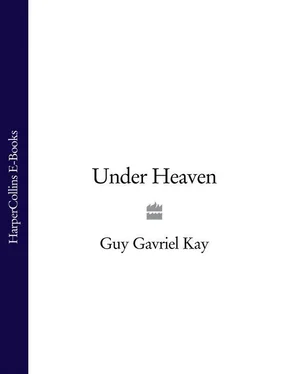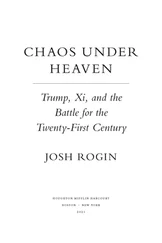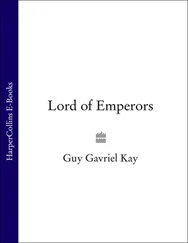He had spent three weeks on one of those, years ago, obscurely curious. Or without direction, more accurately. There had been a period in his life when he was like that. After his time in the north, beyond the Long Wall. Some things had happened to him there.
He remembered the sound in the room where the silkworms were kept on stacked trays and fed, day and night, hour by hour, on white mulberry leaves: a noise like rain on a roof, endlessly.
While that happened, in that time of needful, important perfection, the temperature was controlled, all smells were prevented from entering the room, all drafts of wind. Even lovemaking in chambers nearby was done without sound, lest the silkworms be frightened or disturbed.
He wondered if this Kanlin woman knew this. He wondered why he cared.
Shortly after that, a fox appeared at the edge of the trees, alongside the road to their right.
Wei Song stopped, throwing up a quick hand. She turned in the saddle, eyed the animal. One of the men laughed, but another made a gesture averting danger.
Tai looked at the woman.
“Surely not!” he exclaimed. “You think it a daiji ?”
“Hush! It is beyond foolish to name them,” she said. “And which of us do you think a fox-woman would be here for?”
“I don’t think she’d be here at all,” Tai said. “I don’t think every animal seen by the woods is a spirit-world creature.”
“Not every animal,” she said.
“What next, the Fifth Dragon appears in a red sky and the Ninth Heaven falls?”
“No,” she said, looking away.
It was unexpected, that this crisp, composed Kanlin Warrior would so obviously believe in fox-woman legends. She was still watching the fox, a stab of colour by the woods. It was looking back at them, Tai saw, but that was normal. Riders were a possible threat, needed to be observed.
“You should not be so careless, speaking of spirits, naming their names,” Wei Song said softly, so that only Tai heard. “We cannot understand everything about the world.”
And that last phrase took him hard, sent him spinning back a long way.
The fox withdrew into the woods. They rode on.
The only other time he’d been in command of cavalry had been north of the Wall, on campaign among the nomads. He’d led fifty soldiers, not just five riders, as now.
Command of a dui had been more than he deserved, but Tai had been young enough to feel that his father’s fame and rank had simply opened a doorway for him to show what he could do, what he honestly merited. He’d welcomed the chance to prove himself.
He didn’t want to dwell on it now, all these years after, but being among soldiers again, riding in open country towards a changed life seemed to make it inevitable that his thoughts would drift.
That time among the Bogü had begun the changes in his life. Before that, he’d thought he knew what his course would be. After, he was shaken, unsure. Adrift for a long time.
He’d told what had happened, how it had ended, as best he could. First to his superior officers, and then to his father when they were both home. (Not his brothers: one was too young, the other not a confidant.)
He’d been permitted to honourably resign rank and post, leave the army. It was unusual. Going to Stone Drum Mountain some time later had been a useful, perhaps even an appropriate next stage, though he doubted the Kanlin masters on the mountain saw it that way, since he’d left them, too.
But after what had happened on the northern steppes that autumn, it had not been considered unexpected that a young man would want to spend time searching for spiritual guidance, discipline, austerity.
Tai remembered being surprised that his military superiors had believed his northern tale, and even more at the hint of understanding among them. Understanding was not seen as a strength, let alone a virtue, in the higher ranks of the Kitan army.
Only later did he realize that he and his men might not have been the first or the only ones to encounter some terrifying strangeness among the Bogü. He’d wondered over the years about other stories; no one ever told him names, or what had happened.
He was not blamed for what had happened.
That had also surprised him. It still did. Military rank carried responsibilities, consequences. But it seemed the official view was that some encounters between civilized men and savagery in barbarian lands were not to be anticipated or controlled by any officer. Ordinary soldiers’ conduct could break down in such places.
The Kitan felt a defining superiority and contempt for those beyond their borders, but also fear whenever they left home, even if that was denied. It made for a dangerous intermingling.
For a long time their armies had been going among the nomads to ensure the succession of the chieftain—the kaghan—they favoured. Once you went north of the Wall and its watchtowers you were living in the open or in isolated garrison forts among the Bogü or the Shuoki, fighting beside or against the barely human. It was unreasonable to expect men to conduct themselves as if they were doing domestic duty on the Great Canal or among summer rice fields, guarding peasants against bandits or tigers.
Manipulating the Bogü succession was important. The Ta-Ming Palace had a considerable interest in who ruled the nomads and how willing they were to offer docility along the border and their thick-maned horses in exchange for empty, honorary titles, lengths of lesser silk, and the promise of support against the next usurper.
Unless, of course, the next usurper made more attractive overtures.
The nomads’ grazing lands, fractured among rival tribes, stretched from the Wall all the way to the bone-cold north among birch and pine forests, beyond which the sun was said to disappear all winter and never go down in summer.
Those farthest ice-lands didn’t matter, except as a source of fur and amber. What mattered was that on their nearer margins the nomads’ lands bordered Kitai itself—and ran alongside the Silk Roads—all the way from the deserts to the eastern sea. The Long Wall kept the nomads out, most of the time.
But the northern fork of the great trade routes curved up through the steppes, and so the lucrative flow of luxuries into the glorious Kitan empire depended to a great degree on camel-trains being safe from harassment.
The Taguran empire in the west was another threat, of course, and required different solutions, but for some time the Tagurans had been quiet, trading for themselves with those taking the southern branch of the route, exacting tolls and duties in far-off fortresses they controlled. Acquiring Sardian horses.
Xinan wasn’t happy about this, but could live with it, or so it had been decided. Tagur and its king had been bought off from worse with, among other things, a slender Kitan princess, in the aftermath of wars that had drained both empires.
Peace on his various borders might reduce an emperor’s chances of glory, but Emperor Taizu had reigned for a long time and had won battles enough. Wealth and comfort, the building of his own magnificent tomb-to-be north of Xinan (colossal beyond words, overshadowing his father’s), languid days and nights with his Precious Consort and the music she made…for an aging emperor these appeared to be adequate compensation.
Let Wen Jian’s sleek, clever cousin Zhou be first minister if he wished (and if she wished it). Let him be the one to sort through, after a forty-year reign, the complexities of court and army and barbarians. One could grow weary of these.
The emperor had a woman for the ages making music for him, dancing for him. He had rituals to follow and carefully measured powders to consume—with her—in pursuit of longed-for immortality. He might never even need his tomb if the three stars of the Hunter’s Belt, the asterism of this Ninth Dynasty, could be aligned by alchemists with the emperor’s merit and his desire.
Читать дальше












